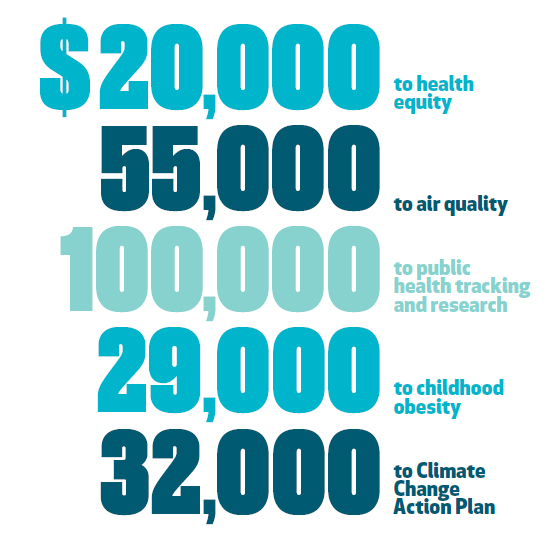
A Pittsburgh Foundation fund supported the director of the Allegheny County Health Department in achieving big internal reforms. Now, as she leaves for a federal post, a nationally respected department awaits her successor.
FOR YEARS, EVIDENCE MOUNTED that showed a widening gap between white and African American health outcomes in Allegheny County. The Health Department responded last year with a plan to narrow it and won a $735,000 Centers for Disease Control grant. It’s the type of funding the department wouldn’t have sought five years earlier for lack of the infrastructure to pull it off. “We wouldn’t have been competitive,” says Dr. Karen Hacker, who had led the department since 2013.
Behind that profound change is the little-known Public Health Improvement Fund, a grant-making account averaging $340,000 each year in pooled contributions by a group of foundations and health care systems. The single purpose: Enable the Health Department to improve itself so it can be more effective in improving the health of the county’s 1.2 million residents. That’s been a long-standing goal of The Pittsburgh Foundation, which has managed the fund and contributed to it since its beginning in 2014.
In the years since, the fund has become a national model — adopted by the Robert Wood Johnson Foundation, for example — for innovative funding of public health initiatives that tax dollars alone could never support.

While operating quietly in the background, it has made a significant impact on public health programming and infrastructure. In just the past year alone, the fund has ramped up the Health Department’s response to the opioid crisis, and supported a study of the breadth and severity of asthma among children and an investigation of the threat of lead in drinking water. It has enabled staff to search mountains of health data and share important findings with the public. Offering promise for the department’s future effectiveness is the “Plan for a Healthy Allegheny,” a comprehensive strategy for improving health throughout the region’s most densely populated county.
“I’ve often called it my R&D fund,” says Dr. Hacker, who left the department this summer to become director of the CDC’s National Center for Chronic Disease Prevention and Health Promotion. “It allowed us to take steps we wouldn’t have been able to take under our own budget. In government, department allocations are challenging at best. There are ideas you have that you can’t find government dollars to support.”
Like many older industrial cities, we have a lead problem affecting children… The department documented the problem so the public and the foundations could work on solutions. That’s the model we want to hold onto.
--Jeanne Pearlman, Ph.D., senior vice president for Program and Policy, The Pittsburgh Foundation
Along with The Pittsburgh Foundation, the other contributors are all deeply invested in public health–related issues: UPMC For You, Jefferson Regional Medical Center, The Heinz Endowments, Jewish Healthcare, Buhl, Hillman and Staunton Farm foundations. Some of these supported the robust national search process that resulted in Dr. Hacker’s appointment.
Recruited from Boston, where she had taught at the Harvard Medical School and led a community health organization, she came to the job with ambitious plans. "Foundation officers who were working in the public health space knew that reorganization of the department would be essential to her being able to carry out the agenda she laid out for us when she arrived,” says Jeanne Pearlman, Ph.D., The Pittsburgh Foundation’s senior vice president for Program and Policy.
A fund dedicated to spurring innovation and improving the capacity of a local government agency isn’t a new concept for Pittsburgh’s foundations. Similar funds were created to improve human services and the county jail. As of June, the $1.7 million in total contributions has supported 36 public projects.
Some monies have been spent on sharpening the department’s response to public health emergencies such as increasing the supply of the overdose response medication, naloxone, to save the lives of those caught up in opioid abuse. Meanwhile, a recent study of childhood asthma plots out where the rates are highest, from neighborhoods along densely traveled traffic corridors to those along the Monongahela River downwind from U.S. Steel Corp.’s Clairton coke works where some of the nation’s worst fine-particulate air pollution levels are regularly recorded.
An ongoing assessment of lead in local drinking water identified children with high levels and neighborhoods most at risk. That initiative offers an example of an important byproduct of the fund: The improvement of the foundations’ relationships with department officials. “Like many older industrial cities, we have a lead problem affecting children,” says Pearlman. “The places where they’re most at risk are in their own homes.
The department documented the problem so the public and the foundations could work on solutions. That’s the model we want to hold onto.”
Another investigation that looked at the racial gap in health outcomes helped shape a countywide response to reverse downward trends of life expectancy for African Americans — as much as 10 years less than for whites; low-birth-weight infants — twice as high as for whites; and infant mortality — three times greater
among African Americans than white residents.
Dr. Hacker relied heavily on the fund to build the infrastructure that earned the department national accreditation in 2017. Fewer than 200 of the country’s nearly 3,000 governmental health departments have achieved that designation since the program began in 2011.
“The fund’s greatest contribution,” says Michael Yonas, Dr.PH., who manages it as The Pittsburgh Foundation’s director of Research and Special Initiatives, “is helping the department evolve into a nimble 21st-century operation that can respond to public health needs now and in the future.”
PUBLIC HEALTH IMPROVEMENT FUNDEstablished January 1, 2014
2018 and 2019 grants totaled $403,544 — all to the Allegheny County Health Department for system improvements that have enabled different projects, including:
|
 |
Original story appeared in the 2018-19 Report to the Community.



